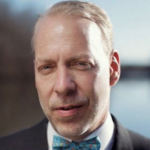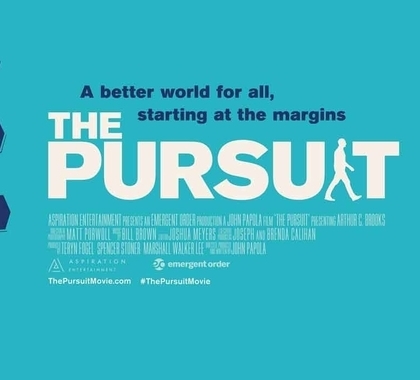If you subscribe to Netflix and care about the future of human liberty, I urge you right now to search and find the documentary called The Pursuit, newly on the lineup of this subscription service. It chronicles the life and thought of Arthur Brooks, an extremely compelling voice for liberty in our times when such voices are both rare and essential.
Brooks is the former president of the American Enterprise Institute and is currently teaching at Harvard University. He is not a politician, not a demagogue, nor a man with all the answers. He is an intellectual, a dreamer, a seeker, and a champion of capitalism. What carries this beautiful film – which is produced and directed by John Papola, who is also making AIER’s video on Marx vs Mises – is not a dramatic plot of some sort; it is a brilliant idea. That idea is freedom – commercial freedom and the opportunity it provides for every person to work, build, aspire, achieve, and be ennobled in his or her humanity.
The timing of this release has never been more important. Having watched and participated in political-ideological realms for decades, I’ve never seen freedom so much under fire. Capitalism, in particular, is being hit daily from the left and the right, the latter turn perhaps the most surprising turn in my adult life. That it’s all happened so quickly reveals just how thin the commitment to commercial freedom was over the last 50 years, or perhaps it reveals how much capitalism’s own champions have somehow failed to inspire the necessary cultural commitment to resist left and right forms of autocracy.
The desperate need of our times, in my view, is a re-presentation of the liberal idea that most all of us have taken for granted through the course of our lives, but which is now massively under assault from all sides. Most presciently, on the same day just two days ago, the US president ordered all American producers to stop doing business with China (whatever that can mean) even as a leading electoral opponent of his pushed out a plan for what amounts to the full nationalization of industry toward the abolition of fossil fuels, with most economic life directly managed by Washington, D.C.. These are the choices we are being presented: two paths toward central planning. It’s remarkable, and deeply alarming.
What’s the way to fight back and push for freedom? The right path is not the ballot box but the world of ideas. It is incumbent upon everyone who cares about the future of civilization to reflect deeply on the practical and moral merit of what we believe in and why, and to have that vision reflected in the way we think, write, and speak.
Advocates of capitalism have not always done that well. Particularly over the last ten years or so, it feels like there has been a real decline in the quality of rhetoric deployed to defend freedom. It’s descended from a high social aspiration to become little more than an assertion of personal rights to this and that, perfectly valid ones, to be sure, but lacking in (or even barren of) a broader aesthetic concerning what kind of society we want to live in.
The great insight of liberalism is that there is harmony between individual rights and community betterment, between the interests of the one and the interests of the many. Sadly, that idea is too complex for most minds (maybe all!) so we end up toggling between one merit at the expense of the other. If we only emphasize our own interests, however, we have failed to provide the fullest possible picture of the meaning and significance of human freedom.
This failure has opened up an opportunity for socialist agitators to dismiss the entire liberal cause as nothing other than a cover for selfishness, greed, racism, and worse. Most of these claims are nothing but smears, but the language and approach of the defenders of capitalism have not always immunized itself against such claims. I need not go into details here because I’m sure you have your own stories. It further doesn’t help that capitalists themselves are quite often the worst-possible apologists for the system from which they have so benefited.
All this is background. The Pursuit models a fresh new way of thinking and talking about capitalism. It is sincere, factually based, socially minded, and open-minded. It centers on the question of happiness itself. What are the essential elements that make it possible? Brooks argues his case based on extensive travels around the world, his true desire to understand the perspective of those with whom he disagrees, his willingness to subject his outlook to empirical and logical tests, and his heart-felt desire to reduce suffering in the world and increase opportunity for all.
Interestingly, Brooks began not as a journalist, scholar, or writer, but as a musician. (I personally identify with this because his career choices more or less track my own.) He was a french horn player who imagined a life of playing in symphonies around the world but his travels put him in contact with communities experiencing desperate poverty. He wondered where it came from and why and became curious about the way out. Like Adam Smith, he began to ask the salient question of where wealth comes from and how it can uplift the largest possible swath of the human population. That’s where his quest began.
The film follows his gradual intellectual transformation into a leading champion of the free economy, all while keeping every bit of his progressive ideals intact. The film is shot in many different locations around the world, even into the thick of anti-capitalist protests in Spain where Brooks engages with some of the activists there, with the hope of discovering shared ideals but different means. That was not always true, sadly, but sometimes there is an interesting commonality that emerges in his discussions with, for example, the 14th Dalai Lama.
Among the most powerful parts of the documentary is the section on the political economy of Denmark, widely considered to be the happiest, most stable, and prosperous society on earth. The examination here is extremely revealing. Denmark’s economy didn’t adopt socialist structures until long after the foundation of that prosperity and peace were laid, and the country has spent decades desperately rolling back government involvement in economic life.
The welfare state in Denmark is still large and taxes are high, but all essential functioning of the economy is driven by market signaling. However, and this is where the documentary touches on an actual creepy topic, the homogeneity of thought and action in this small country is actually what most Americans would regard as inconsistent with individualism. There is no room for eccentricity in the culture and pressure to conform has been intensified via the welfare state. This is actually what one might expect since there really is a contradiction between diversity and welfare, as I’ve written about at length. This documentary deals with this topic with sensitivity but also in a way that reveals certain features of the “ideal” society most people would not actually like.
All that aside, the core message of this film is that capitalism is the path toward the universalization of wealth and provides the best possible grounding for individuals to live happy lives of aspiration and achievement. As Brooks says repeatedly, the rich can take care of themselves; the great challenge of social organization is to find a system that helps the poor rise up. He really does make the case that it is capitalism, not any form of state planning, that fits the bill. He says it all with warmth and sincere commitment.
Again, this is not some lame strategic challenge for all of us to change the way we write and talk. It’s a challenge for all of us to re-consider the idealistic foundation of freedom itself, to broaden it beyond what is good for the few (even just the nation alone!) and fear not thinking in terms of what is good for everyone. Indeed, Brooks has no hesitation about speaking of the common good, just as Mises did before him.
I’m still thinking through what might be the most refreshing part of this documentary. You know what it might be? The absence of anger. That’s such a relief, especially given the topic. Even more than that, it is the presence of love, another word that Brooks uses freely to describe what it is we are going for here.
I don’t want to give the impression that Brooks strategy is to turn the case for capitalism into a mush-headed emotional plea only for social justice. Far from it; the case he makes here is empirical first, and moral second. We know the way toward the universalization of wealth; it is right, then, that we should embrace it in the interests of everyone.
I’m struck by what a seachange Brooks’s way might be for the cause of freedom. Long before Brooks took over as president of the American Enterprise Institute, I variously had lunch there with Irving Kristol, Michael Novak, and Gottfried Haberler – all great and mighty minds of their time. But back in those days, capitalism as a cause was mostly regarded as a political cause.
For Brooks, matters are different. Capitalism for him is a humanitarian cause. Something tells me that if we are ever going to regain the footing in public culture, the Brooks path might be the one to make it happen. Even if it is not, we can all learn from his outlook by adopting a more learned, sincere, and humane outlook toward the loving contribution that freedom has bestowed upon the world.
Watch this film now and thank me later.
[Originally Published at AIER]





